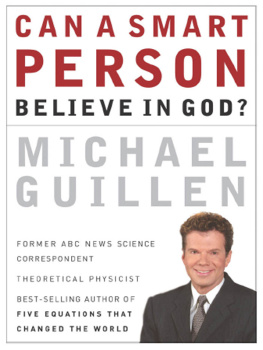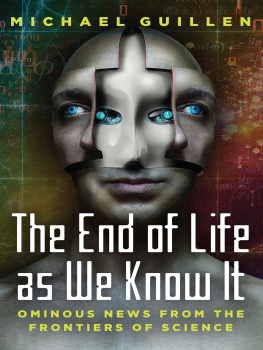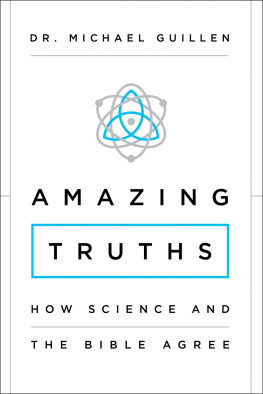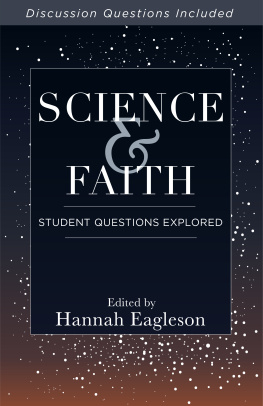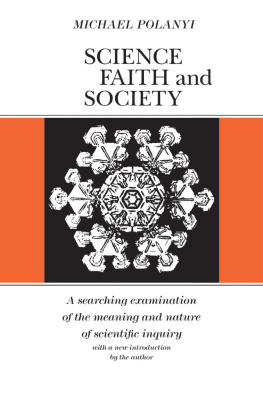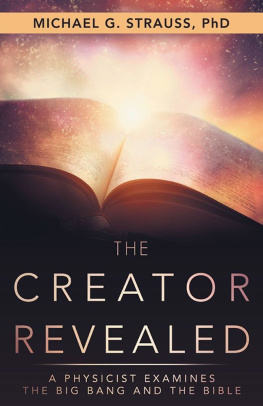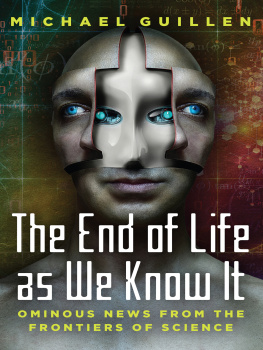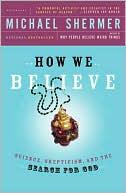
Copyright 2004 by Michael Guillen
All rights reserved. No portion of this book may be reproduced, stored in a retrieval system, or transmitted in any form or by any meanselectronic, mechanical, photocopy, recording, scanning, or otherexcept for brief quotations in critical reviews or articles, without the prior written permission of the publisher.
Published in Nashville,Tennessee, by Thomas Nelson, Inc.
Unless otherwise indicated, Scripture is taken from the HOLY BIBLE, NEW INTERNATIONAL VERSION. NIV. Copyright 1973, 1978, 1984 by International Bible Society. Used by permission of Zondervan Publishing House. All rights reserved.
Scripture marked NKJV is taken from THE NEW KING JAMES VERSION. Copyright 1979, 1980, 1982 by Thomas Nelson, Inc. Used by permission. All rights reserved.
Library of Congress Cataloging-in-Publication Data
Guillen, Michael.
Can a smart person believe in God? / Michael Guillen.
p. cm.
Includes bibliographical references.
ISBN 0-7852-6024-2
1. Faith and reasonChristianity. I.Title.
BT50.G85 2004
261.5'1dc22
2004014212
Printed in the United States of America
04 05 06 07 08 QW 5 4 3 2 1
To my sisters Delores and Deborah,
who, like God, have always loved me,
flaws and all.
Contents
The eye is the lamp of the body.
If your eyes are good, your whole body will be full of light.
But if your eyes are bad, your whole body will be full of darkness.
Matthew 6:2223
Some years ago, as ABC Newss science editor, I participated in a TV special hosted by Peter Jennings on the subject of prej-udice. In one of the segments, we did an experiment featuring a schoolteacher and large group of students.
The teacher began by dividing the kids up into two camps: Blue Eyes (Bluies) and Brown Eyes. Then she proceeded to explain that Bluies tend to be slower, clumsier, and dumber than other kids.
To reinforce the lesson, every time a blue-eyed kid made the slightest mistakemuch to the delight of all the Brown Eyesthe teacher said something disparaging like, What else would you expect from a Bluie? As you can imagine, after just a few minutes of this, most of the blue-eyed kids were thoroughly cowed, and some were even in tears.
I tell you this story because we, too, are split up into two camps: those who believe in God and those who believe in something else. Youll notice I resisted lapsing into the common practice of referring to the two camps as Believers and Nonbelievers; doing so would encourage the totally erroneous notion that believing or having faith is something only some of us do. Truth is, every one of us believes. Every one of us has faith. What divides us are the different objects of our faith, our different gods.
According to a Newsweek poll conducted in 2000 by Princeton Survey Research Associates, 94 percent of usmyself includedbelieve in the existence of God. (According to George Gallup Jr. and D. Michael Lindsay, in Surveying theReligious Landscape:Trends in U.S. Beliefs: Over the past fifty years of research, the percentage of Americans who believe in God has never dropped below 90%.) This is an astonishing percentage, considering the notion of an unseen deity who created and possibly still interacts with the universe is (lets be honest) pretty far-out. You cant get that many people to agree on even relatively mundane issues, such as: What is the exact color of this paper? or Is it better to unroll toilet tissue from the bottom or the top?
According to the same poll, 4 percent of Americans dont believe in Goda pretty meager percentage, given the dis-proportionate attention and clout this camp appears to enjoy in todays secular age. The poll didnt ask what they do believe in, but from my experience it would certainly include Randomness, a god whose supernatural-like powers can allegedly transform complete chaos into exquisite order.
Each camp has powerful arguments to defend its respective deity, all too often using them to put one another downas in the blue and brown eyes experiment. Thats why Ive written this book: first, to contribute some civility to the overall debate, and second, to rebut the argument that those who believe in God are dumber than those who do not. I hear this unseemly and unfounded prejudice voiced a lot these days, mainly from secular humanists who see themselves as smart, free-thinking realists and believers in God as dim-witted, superstitious sheep.
The accusation is expressed in many different ways, but its underlying message is always the same: you cant possibly be an enlightened, scientifically literate person alive in the twenty-first century and still believe in God, or in all the celestial trap-pings that go with Him. Its as if, as we venture forth into the new millennium, theres a gigantic Dante-esque sign overhead that reads: Abandon Faith, All Ye Who Enter.
The Soviet cosmonaut Yuri Gagarin, first person to orbit the earth, quipped while in space: I dont see any god up here. Similarly, a machinist from Toledo, Ohio, remarked: No, I dont believe in God[after all] did the space travelers ever see heaven in their trips?
God is now obsolete, declares the modern-day Doubting Thomas, superceded by deities of a more earthly variety. The report of an MIT professors imperious reaction to a campus event being sponsored by a Christian group says as much: We dont care that these people are here, he reportedly scoffed. At MIT, science and technology are the gods we serve.
Coming face-to-face with such bold atheism from a person with such impressive academic credentials can be intimidating, no matter who you are. Its the rare person among us whose confidence in God is so utterly rock-solid it cant be secretly shaken by some overzealous humanist accusing him of being a bonehead for having faith in something that allegedly doesnt jibe with todays scientific/intellectual paradigm.
I pray and fully expect that if you believe in God, then after reading my book, youll feel more secure in the face of such confrontations. It contains many different lessons in how to defend and strengthen your faithpractical lessons Ive learned from my lifelong association with both camps.
IQ Versus SQ
Who am I, and why should you care what I have to say? Im the offspring of two very different worlds: one intensely intellectual, the other intensely religious. One a world of logic and IQ, the other of spirit and what I call SQ.
IQ, as everyone knows, stands for Intelligence Quotient. Its a measure of our ability to perceive the relatively obvious, physical aspects of reality; to solve problems and acquire conviction intellectually.
SQ stands for Spiritual Quotient, that ineffable, instinctive aptitude I believe were all born with. I claim SQ is a measure of our ability to perceive the subtler, nonphysical aspects of reality; to solve problems and acquire conviction spiritually.
Ive even created a quiz to test your Spiritual Quotient. Its not a rigorous examination, but it will give you a rough idea of how well developed you are in this regard.
And just in case youre wondering whether you should care, consider the recent explosion of scientific research on the subject. In 2002, sociologist Byron R. Johnson and his colleagues at the University of Pennsylvanias Center for Research on Religion and Urban Civil Society wrote an article titled Objective Hope, in which they evaluate 498 studies published to date in peer-reviewed journals. The vast majority of the studiesanywhere from 65 to 97 percent of themshow that spirituality is associated with a long list of physical, mental and emotional benefits: lower levels of hypertension, depression, suicide, sexual promiscuity, drug addiction, alcohol abuse, and criminal delinquency, plus higher levels of academic achievement and feelings of well-being, hope, purpose, meaning, and self-esteemas well as a longer life span.
Next page
